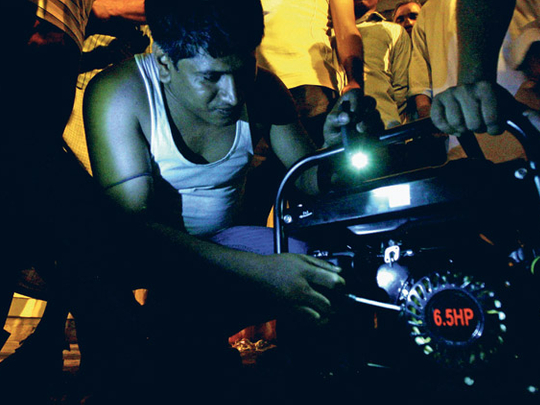
Sharjah: Businessmen and residents reacted furiously to the idea of doubling the electricity tariff in Sharjah and said this would hinder economic activities in the emirate.
"[A] reasonable rate of uninterrupted power supplies was the main reason behind the migration of foreign investments into the UAE... any change in the environment would cause investments [to] depart from the emirate," Ashraf Khalid, an Asian investor and owner of an industrialist firm told Gulf News.
In its power conservation campaign, the Sharjah Electricity and Water Authority (Sewa) had said that the cost of producing electricity was double the tariff Sewa imposed on its consumers.
Monopoly
The authority maintains a monopoly over the production and distribution of water and energy in the emirate. In October last year, Sewa had increased tariff on expatriates, commercial and industrial consumers by almost 44 per cent.
It introduced a 30 fils per kilowatt flat rate instead of a multi-layered tariff system starting from 20 fils per kilowatt. The authority said earlier that production of power costs around 60 fils per kilowatt as per Sewa's calculations.
Khalid said that Sewa will probably not be able to impose its cost rate without consulting with the authorities of neighbouring emirates. "Who is going to stay in Sharjah when it doubles the power rate when Dubai or Ajman charges 40 to 45 per cent of the rate.
"Electricity costs between 10 and 20 per cent of the monthly family budget and it would be unfair for residents to accept such a huge increase in power tariff if imposed in Sharjah," Khalid said.
Sewa has not announced a deadline for increasing its power tariff or if such an increase was definite but sources from the authority said that with the current level of debt there is no way out but for Sewa to increase tariff, amongst other tough measures to be taken by the authority.
Another commercial source, who spoke on condition of anonymity, said neither the local government nor the federal authorities were willing to subsidise the consumption of power production in Sharjah or bear the difference in costs.
Bearing costs
"Sewa cannot continue to buy fuel from suppliers simply because they are not confident about the ability of the authority to pay the bill," he said. He said Sewa has no option but to maintain its scheme imposed on the city on hot days, placing the supply of residential areas and areas with a majority of UAE nationals as top priority.
"Free zones at the airport and Hamriya are still prioritised against supplying power to the industrial areas and areas with non-national majority," he said.
Huzaifa Ahmad, an Arab expatriate resident, said there is a need to consider the establishment of a more efficient power production authority in Sharjah.
"I think an efficient authority that charges users equally would not need to double the tariff at this stage. Even if increasing the current tariff becomes necessary, consumers like me, would understand the decision and would support it," he added.
Are you still being affected by the power cuts? How did you spend your time? Were you able to get through to Sewa? Share your experiences.












